Big Brother: Split After Video Surveillance of Cultural Heritage in Center
If you don’t already feel like somebody’s watching you in Split (cue Rockwell song here), you will now.
Namely, Slobodna Dalmacija reports on June 5, 2019, that the city has announced a tender to purchase video surveillance systems for 13 public areas, and the estimated value of the equipment and its installation is 1.87 million kuna. The areas to be carefully watched include Trumbićeva obala (West Coast), Matejuška, Sv. Frane Church, Marmontova, towards Tončićeva, and Trg Gaje Bulata in front of the theater.
Ulica kralja Tomislava will be supervised at three locations - in front of the pharmacy, at the "Semafor" cafe and in front of the Art Gallery. The Golden Gate of Diocletian’s Palace will be monitored, as will the monument to Grgur Ninski, and there will be a camera at Hrvojeva to overlook Đardin. Peristyle, as expected, will also be filmed.
But that’s not all.
On the Riva, there will be video surveillance at the entrance to the Podrum, and next to the monument to Dr. Franjo Tudjman. The cameras will not escape Pjaca, either.
The surveillance equipment will be located in sensitive areas featuring precious cultural heritage, especially at the Golden Gate of Diocletian's Palace and Meštrović's prized work of Grgur Ninski. In this area, the tender calls for a pillar six meters high to fit the camera, so it will be interesting to see exactly where it would be placed.
The tender also requires columns for Ulica kralja Tomislava, Hrvojeva, and the Dr. Franjo Tudjman monument. In the tender from the City, the equipment and supporting works are said to have conservatory approval.
However, video surveillance around Split’s center is no new idea. Recall, it first came to the table in 2014 by Ivo Baldasar. The first attempt was at Peristyle, where in July 2016, cameras were placed at the Šegvić house, when it was the branch office of Splitska banka.
The Elaborate Safety Survey of Public Road Areas was also developed, and the entry and exit at Ulica Domovinskog rata and Poljička have also been approved for the video surveillance system. The main system will be located in Banovina (City Administration), and the remote monitoring that will be possible from the city administration will be performed by the selected security company, but also by the police.
As one of the conditions, it is stipulated that "the provided cameras must have the ability to mask certain parts of the cadres, to prevent the surveillance of individuals and objects."
Namely, public authorities may collect data for security when the law allows them, but they must ensure that the data they collect is protected. The person in charge of access to information should be named, the data must be kept locked, they must determine who has the entry codes in this area, and the act prescribes how the recordings are processed. Technical and organizational measures for the protection of personal data must be taken, as this video is personal information. It can be kept for six months, unless a special regulation imposes a longer deadline, said lawyer Dijanu Kladar, a legal consultant for personal data protection.
Kladar claims that you can record the public areas and the people in them, but cannot exclude certain people.
“The Personal Data Protection Agency's opinion is that they can be filmed in public surfaces, but one person cannot be picked out of the mass and put it in a newspaper without their consent,” explains Kladar.
To read more about lifestyle in Croatia, follow TCN’s dedicated page.
VIDEO: Split Beaches Ready for Summer? Yes and No
Summer is right around the corner, and one of the most beautiful beaches in Split, Kaštelet, which is better known as Obojena, will shamefully welcome the new season. The Split Obala firm, as far as their workload is concerned, did only what was needed to upgrade the beach before the season, and did not even bother to fix the broken stone shower which was set up last year, reports Dalmatinski Portal on June 4, 2019.
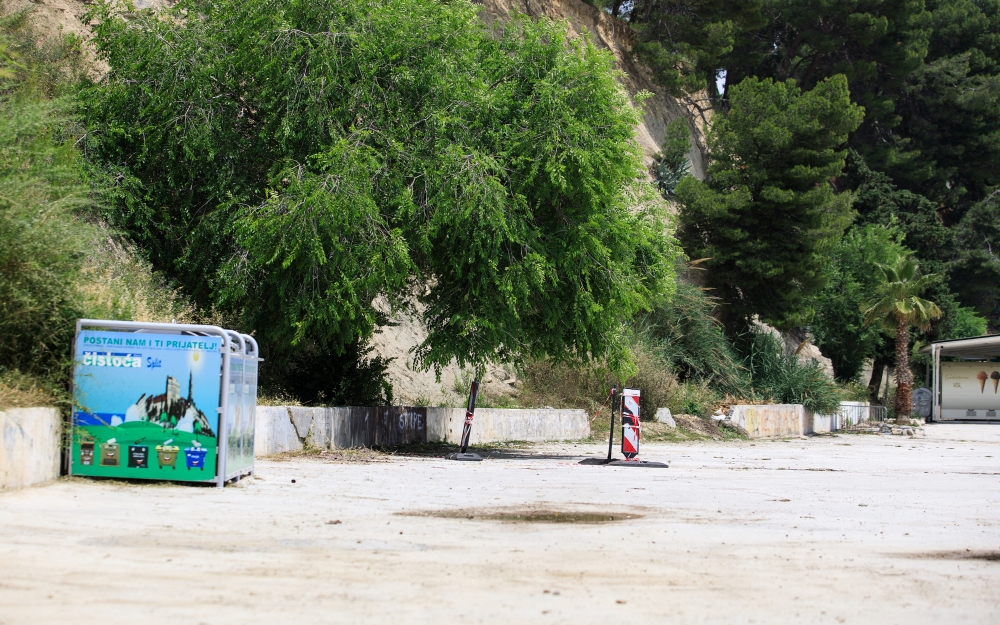
Milan Šabić
The entrance to the sea is disastrous - it is bare, with sunken in puddles, broken walls, and graffiti.
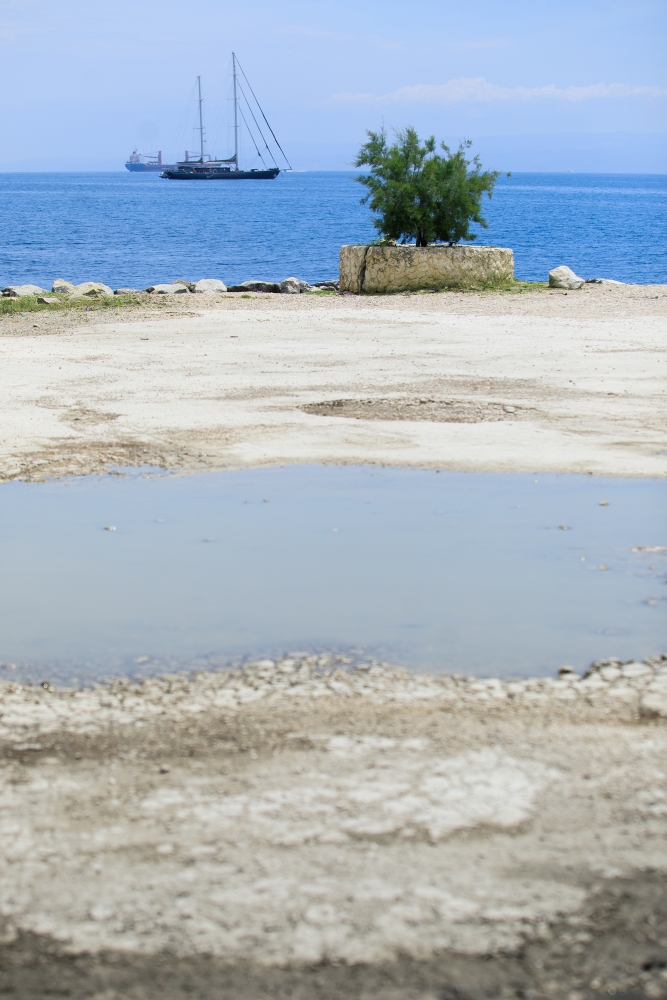
Milan Šabić
Obojena was one of Split’s most popular beaches, and thanks to Dragan Jurišić Jenki, the concessionaire at that time, the soul of the beach was not sold to lounge chairs, allowing it to remain mostly untouched. However, after the demolition of the illegally constructed buildings last year, Obojena now looks a bit desperate. Apart from asphalting the access road, the beach saw few cosmetic upgrades.
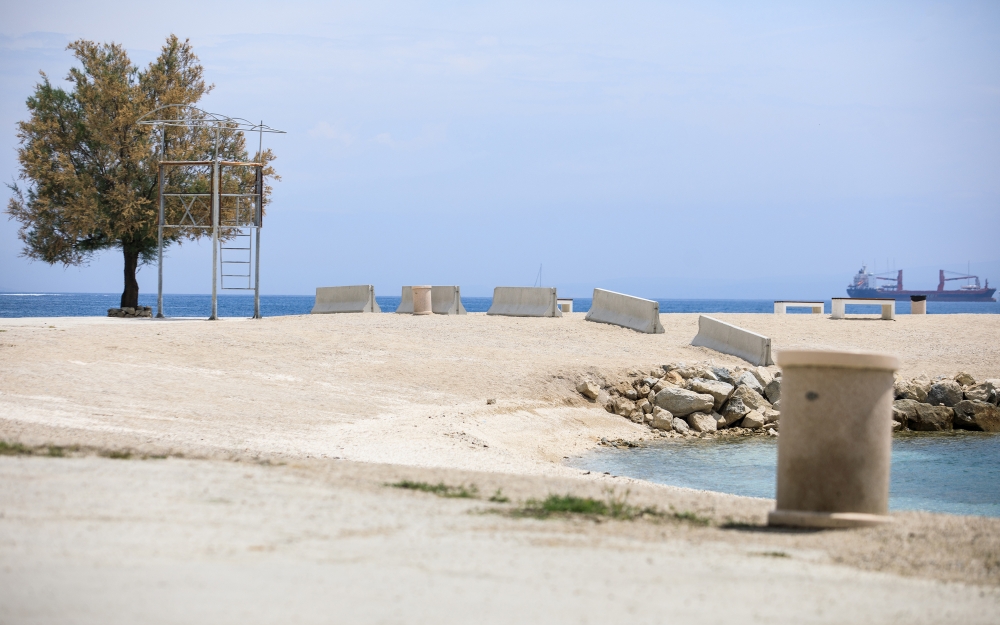
Milan Šabić
There are no concession permits in the Maritime Management Plan, although the city, under the euphoric impression of Žnjan's design, announced identical modules in Kaštelet.
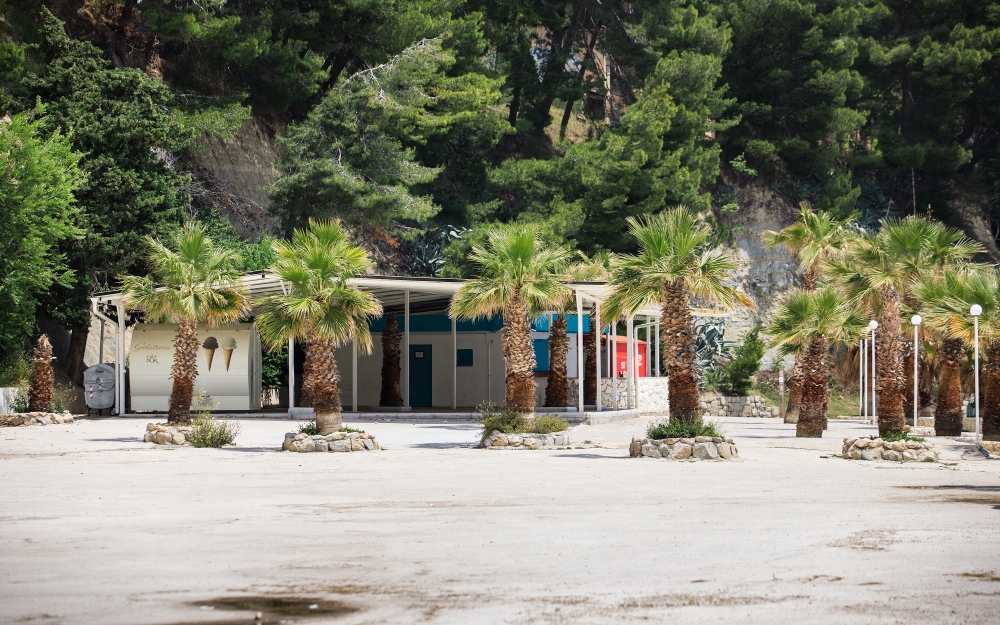
Milan Šabić
However, it seems that Obojena has been forgotten.
Just down the road at Kašjuni, we might add, preparations are in full swing for swimmers. Namely, the entrance to the sea has been fixed up with the help of excavators, and sand has been brought in to level the ground around both catering facilities.
The lounge chairs and canopies are ready to go.
Recall, in Žnjan, works have been ongoing to prepare the beach since March. Last year, eight catering units, each made up of two modules (12 × 12 meters) plus storage space and 300 to 400 square meters of terrace, was implemented last year. The popular Split beach opened their doors to caterers after all illegal facilities were removed in the fall of 2017. Cafes are expected to have better traffic than last year, as they didn’t begin operations until the middle of the 2018 season.
According to the announcements, the final solution to Žnjan should be implemented in the summer of 2020.
To read more about travel in Croatia, follow TCN's dedicated page
With Just Over a Month to Go, Hajduk and Ultra Europe Still Negotiating?
Ultra Europe is set to take place in Split from July 12 to 14, 2019, however, Hajduk and Ultra are still without an agreement, and allegedly, a contract has yet to be signed, according to Slobodna Dalmacija on June 3, 2019.
The Split football club and the leadership of one of Europe's largest music spectacles have apparently not found common ground in the latest round of negotiations, and Hajduk-Ultra talks so far have not been fruitful.
Namely, Hajduk is justifiably afraid of the aftermath of the music festival and how it has devastated the Poljud football pitch over the years. Hajduk does have reason to worry, because Ultra conflicts with the beginning of the season when European games are played and the Croatian First League begins.
Thus, the club is looking for a guarantee that this will not happen again, and that above all, Hajduk has a functioning pitch on time and one that is suitable to host European clubs.
And, after years of experience, putting in a new pitch is the only guarantee that it will be at an adequate level after the festival.
Unfortunately, both sides are not on the same wavelength - and it's already too late to discuss changing the pitch now. Namely, if the other party agrees to replace the pitch, all the deadlines have already been exhausted. Recall, there are only 40 days left until the beginning of Ultra, and a lot that goes into implementing a new lawn, i.e., grass needs to be ordered, delivered, etc.
Considering Hajduk’s first round of Europa League will be played from July 11 to 18, 2019, the club could potentially move the game to Dugopolje, which is some 30 minutes away from Split. The downside, however, is that the stadium holds considerably fewer fans, which would result in fewer tickets sales and, well, a loss of the atmosphere in general.
So, what will happen next? Stay tuned.
To read more about lifestyle in Croatia, follow TCN’s dedicated page.
Where to Get Your International Food Fix in Split? The 2019 Guide
June 4, 2019 - Hungry for something a bit more ‘exotic’ on your visit to Split? We bring you the 2019 guide to international cooking in the Dalmatian capital.
Just over a year ago, I presented the 2018 guide to international cuisine in Split.
“I will begin by saying that this article in no way downplays the beauty that is Dalmatian cooking. Anyone lucky enough to take a bite of fresh fish off the grill, only to pick up the remnants with a chunk of crusty bread soaked in garlicky olive oil, knows how lucky we are to be in Dalmatia. And no, I do not believe that anyone could ever grow tired of black cuttlefish risotto, seafood pasta, or classics such as ćevapčići and paštisada.
But as much as we love the flavors of the region, sometimes our taste buds have something else in mind - and rather than fight and grow irritable from hunger, we give in.
Though we are lucky to be in Split for many reasons today, we might find ourselves even more fortunate than generations of the past because we have access to even more international flavors than ever before.”
While this all reigns true today, it’s important to note that the ‘international food boom’ in Split has seen considerable growth in just 12 months - and it seems like this global food trend is here to stay.
So, where to grub in this newly emerged international food hub?
Alas, the 2019 guide.
Asian
Mini Bota Oyster & Sushi: No longer the Oyster & Sushi Bar Bota we’ve known over the years, but no less exciting, Mini Bota is the new oyster and sushi take away, delivery & catering service of your favorite fusion of Japanese and Dalmatian cuisine in the center of Split. Not unlike the original Split Bota we’ve known since 2014, Mini Bota offers a wide array of rolls, sashimi, and hot favorites such as teriyaki chicken and beef, tempura shrimp, and egg rolls - and the oysters and tuna tartare are divine. If you’re lucky, try snagging a few seats at the intimate countertop to watch the sushi masters prepare your delights in an open kitchen.
Address: Cosmijeva ul. 7
Adriatic Sushi & Oyster Bar: Adriatic Sushi has been an excellent addition to Split’s growing love for Japanese creations. Not only can you find menu items such as fried oysters and a Mexican burrito roll, but spring rolls, soft shell crab, and tuna in a ‘yunagi’ sauce have quickly won the hearts of Split foodies. And of course, if you’re looking for something a bit more simple, you can always rely on the steak or grilled salmon to tame your palate.
Address: Carrarina Poljana, 4
Biberon Sushi & Bar: Located outside the center in the Firule/Zenta area, Biberon offers sushi rolls, spring rolls, gyoza, salads, teriyaki dishes, and tempura classics.
Address: Put Firula 57
Silk: Silk’s second location in Dalmatia opened in Split just before the 2018 summer season kicked off, and it’s been welcomed ever since. Known for Asian street food creations made fast, at Silk, you can find popular noodle dishes such as pad Thai, red curry, gyoza and spring rolls, crispy squid, Peking duck, and kimchi fried rice.
Address: Tončićeva ul. 4
Kinoteka: Another Asian fusion restaurant that opened just before the season last year is the oh-so-classy Kinoteka. Situated in a 15th-century palace, Kinoteka is not only one of Split’s most elegant locations, but their decorated menu will have foodies drooling at first sight. Diners at Kinoteka can enjoy anarray of fresh sushi and nigiri, tom kha kung soup, pork ramen, green curry, hoisin duck, and some of the most beautiful (and refreshing) looking cocktails out there.
Address: Majstora Jurja 8

Kinoteka
Maka Maka: Yet another new one to the Split food scene last year is Maka Maka - known as the first açai and poke bar in the city. Here, you’ll find juices, smoothies, açai bowls and poke bowls “from Tokyo via Honolulu to Split”.
Address: Pistura 1
Chang: This restaurant was a brand new addition to the busy Bačvice beach in 2016, and rather than offer Japanese delights, they take on the flavors of Thailand. Dumplings, fresh spring rolls, Pad Thai, sticky chicken, and beef noodle dishes can be found at Chang, and their refreshing juices and tangy cocktails allow beachgoers at Bačvice to quench their thirst.
Address: Uvala Bacvice | Bačvice beach
Biser Orijenta: The original Chinese institution in Split, Biser Orijenta changed locations in 2017 to Split 3. If you’re looking to indulge in chow mein, Mongolian beef, egg rolls, hot and sour soup, and many other classic Chinese dishes, paying Biser Orijenta a visit is worth it. Though outside the busy city center, the new space can accommodate big groups, unlike many of the restaurants within the palace walls.
Address: Dobrilina 1a
Restoran Asia: Another Chinese restaurant outside the center of Split is Restoran Asia, which opened its doors back in 2016. A traditional Chinese restaurant that offers room for 150 hungry guests, Restoran Asia has a wonderful selection of noodle dishes, soups, crispy duck, tie-pan dishes, and fried bananas for dessert. Restoran Asia also has set menus for up to four guests in case you’d like to leave it up to the experts - they do know best.
Address: Poljička cesta 39

Silk
Wok Bars: Split currently has two wok bars in the center, Wok Me Away, and That’s All Woks. If you’re looking to get a quick international fix, at either wok bar, guests can create their dishes including a variety of noodles or rice and choose from sauces like teriyaki, ginger and garlic, coconut curry, and sweet and sour.
Wok Me Away Address: Matošića ul. 8,
That’s All Woks Address: Obala Hrvatskog narodnog preporoda 25
Split Malls: Believe it or not, shoppers can even get a taste of international flavors to fuel their tired hands from constant credit card swiping. The Mall of Split offers shoppers Chinawok, while ‘Chinese Food’ is located on the first floor of City Center One.
Mexican
To Je Tako: If you’re looking to satisfy your Mexican fix, you’ll want to head straight to To Je Tako. Not only does this restaurant include Honduran favorites such as the refried-bean goodness that is anafre, but cheesy jalapeno kickers like bolitas, a classic mole, al pastor tacos and burritos, chimichangas, flautas, chilaquiles, homemade salsas, and ropa vieja will have you coming back for more. To Je Tako even has a selection of creative cocktails on offer - and we promise you'll want to dig right in.
Address: Ulica Kraj Svetog Ivana 5

To Je Tako
Panchos: If you’re looking for a hit of Mexican, and fast, run over to the alleyway of Panchos and choose from their selection of burritos, burrito bowls (naked, without the tortilla), and quesadillas. You can even grab chips and salsa or guacamole if you feel like snacking around town.
Address: Trogirska 1
Others: Bistro Toć and Terminal F offer their version of Mexican food, with a selection of tacos and burritos on the menu.
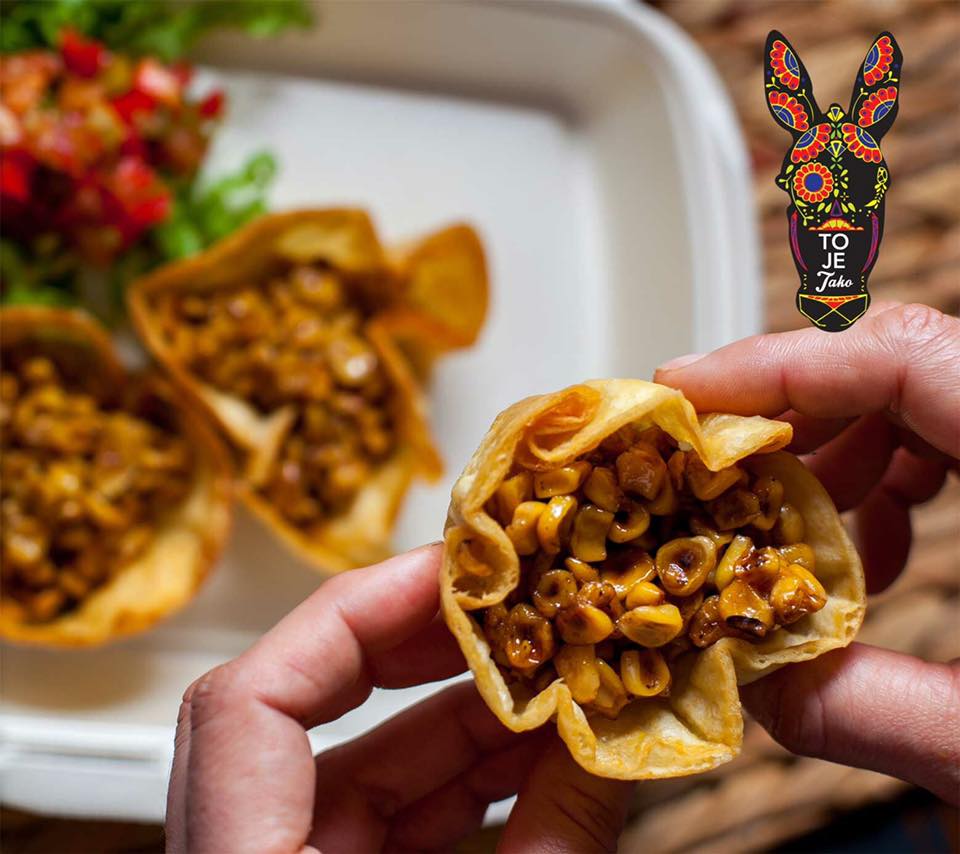
To Je Tako
Middle Eastern
Daddy Cool: Because you can even satisfy your falafel urge in Split, Daddy Cool opened last year and has been a major hit. With different falafel option like original, shrimp or beef, you can also try falafel salads and hummus bowls with shakshuka.
Address: Kralja Tomislava 4

Daddy Cool
Kebab House: Perhaps everyone’s favorite late-night stop before sloppily walking home is the Kebab House, located right across from Pazar (the Green Market). Known for serving up kebabs the way you want them, this Split institution is not only cheap, but it's fast.
Address: Na Tupini 1
Kebab Pub: Ever tried kebab pizza? You can now at Kebab Pub! Open late and also a pub (yes, you heard that right), Kebab Pub offers kebabs in a bun, in a tortilla, and serves up pizzas, pide (traditional flat bread), and raw köfte.
Address: Vukovarska ul. 7
Other
Fig: Fig is brand new to the Split restaurant scene this year, though you may have heard of them before thanks to their loyal following on the island of Hvar. Serving up a blend of international flavors from vegetarian breakfast burritos and green chile burritos to vegetarian korma and Mexican pulled pork, Fig has quickly become a new Split favorite.
Address: Dioklecijanova Ulica 1

Fig
Sexy Cow: While wraps may not necessarily seem ‘international’, there is something about Sexy Cow that satisfies that international urge. Maybe it’s because some of their wraps are served with a guacamole sauce, or maybe it’s because their signature chef’s sauce has a hint of chipotle, but if you need something quick - Sexy Cow is a definite go-to.

Sexy Cow
Marta’s Veggie Fusion: Marta’s may be a haven for vegetarians, but it’s also spiced up with some international menu items. Namely, their black bean burrito is created with spicy rice, corn salsa, slaw, sauces and jalapeno peppers (though you could also get it as a bowl), and they even have a wok dish with crispy vegetables and jasmine rice.
Address: Ul kralja Petra Krešimira IV 8
Stay tuned as we'll be bringing you the guide to Split's best healthy food spots next!
To read more about lifestyle in Croatia, follow TCN's dedicated page.
Split Airport to Hvar by Catamaran: Testing New Split Express Service
June 3, 2019 - A new fast catamaran service linking Split Airport to downtown Split, Brac (Bol) and Hvar (Stari Grad) began on Saturday. TCN's Rhona Crosbie was among the first Split Express passengers.
It is a few years now since the demise of the European Coastal Airlines seaplane service, which briefly offered quick transfers from several points on Croatia's mainland and islands, as well as flights from Croatia to Italy. The service was never the most reliable, but when it worked, it was a dream. Fifteen minutes from Resnik, the bay by Split Airport, to downtown Jelsa was a dream for me personally when I lived in Jelsa.
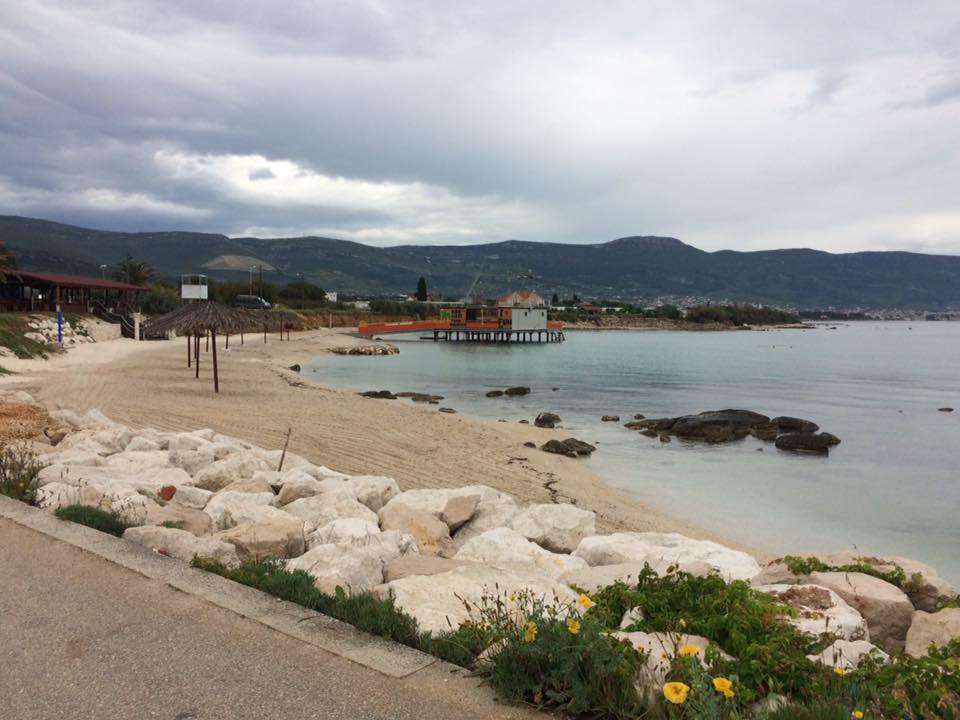
Since then, there has been no affordable and quick transfer option to Hvar from the airport, unless you wanted to shell out 350 euro plus on a speedboat or perhaps a helicopter.
A new service, Split Express, started two days ago, offering connections between Resnik, a short 500-metre walk from the airport terminal, to downtown Split, Bol on Brac and Stari Grad on Hvar. TCN contributor Rhona Crosbie flew into Split from Scotland and decided to try the new service, cost 199 kuna one way (299 return).
As you can see from the timetable below, the daily sailing schedule has both direct connections with the airport from Stari Grad, and indirect connections via Bol. The direct afternoon connection from Stari Grad taking just one hour to the airport is a dream compared to the need to get the 2-hour ferry to Split and then the bus/taxi to the airport from there.
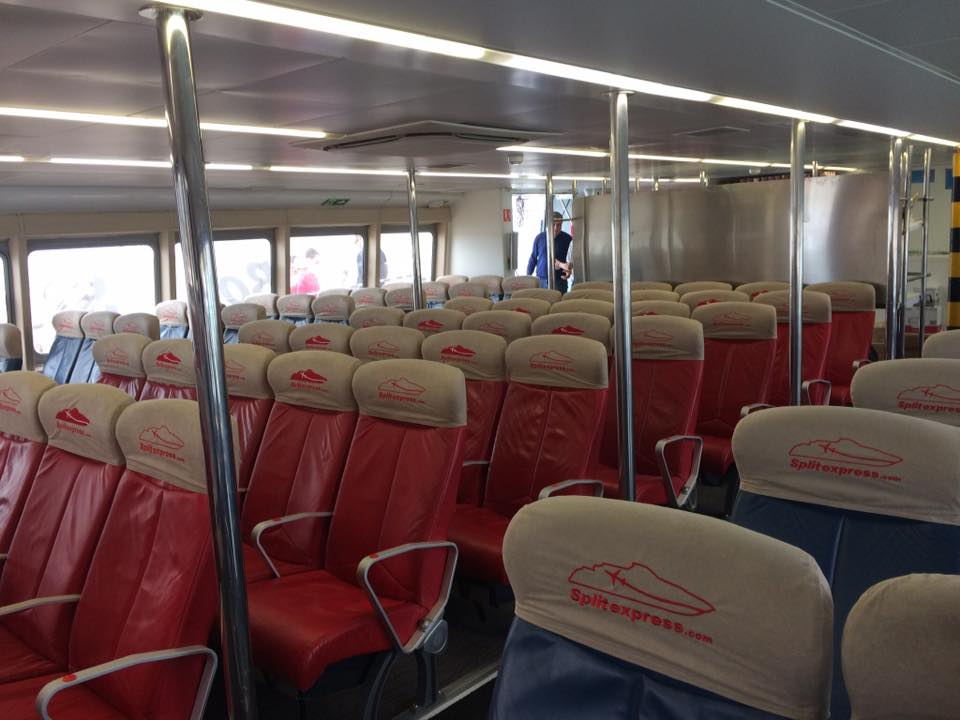
The new service has only just started, and Rhona said that the company were in the process of setting up portacabins and a booth at the airport. She wandered down to the bay (a straight walk from the airport terminal) and found plenty of space on the new service. There were about 20 passengers in total, most of whom alighted at Bol. The service was extremely comfortable, included a free drink, and took 1 hour 50 minutes with the stop in Bol, still much quicker than going into Split and taking the ferry.
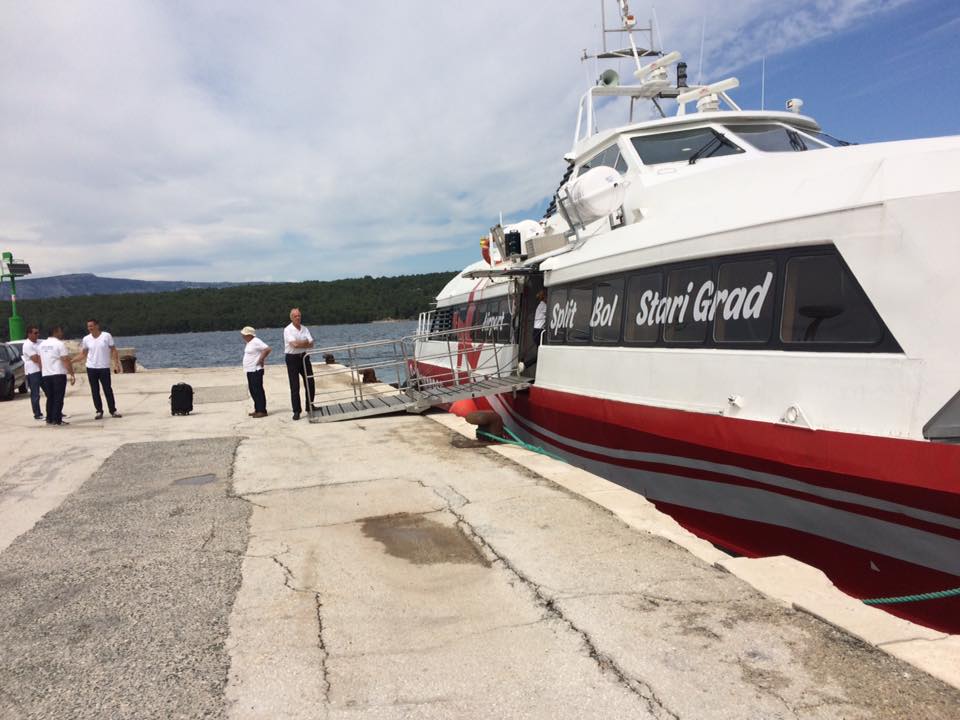
One more option to reach both Bol and Stari Grad, and if you fancy a quicker and less congested option to downtown Split than taking the bus, 99 kuna will buy you a one-way transfer - see the timetable below.
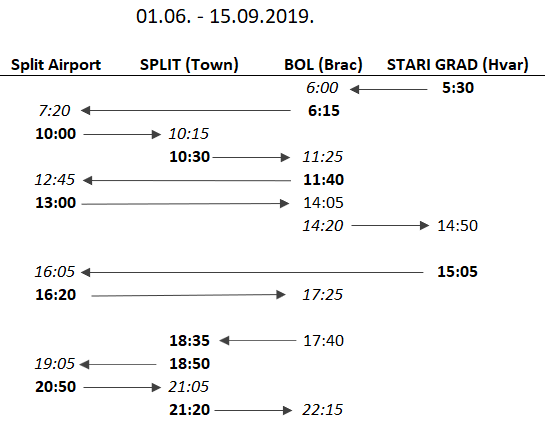
To learn more about the island of Hvar, check out the Total Croatia Hvar in a Page guide.
New Director, New Rules: Promet Split Reveals Changes, Plans in Bus Transport
Slobodna Dalmacija reports on June 2, 2019, that Promet Split ended last year with a loss of 15 million kuna, which unfortunately isn’t news but a long-term trend for the Split public transportation company. Miroslav Delić, who has assumed the duties of Promet’s director since the beginning of February, explained that such a poor financial result was due to a steady decline in revenues, a rise in expenditures and constant liquidity.
As stated, exiting from this situation will be attempted in the financial consolidation of the company, i.e., future business without loss, renewing the fleet, as well as restructuring the company while improving the working conditions and material position of employees. Delić admitted that after taking office and getting acquainted with the company, its state was worse than he thought.
“The first step in financial consolidation was made, and since March and April there has been better communication and mutual understanding, and through talks and negotiations with all co-owners of “Promet”, we managed to sign an agreement on the provision of communal services and compensation for the costs of passenger transport in public transport. Also, we are preparing new revenue-raising measures, such as the introduction of a daily and three-day bus ticket, and we will propose a price of 25 and 75 kuna at the next meeting of the Assembly. We also plan to increase revenues by introducing integrated transport on the Split-Split Airport route, where we will negotiate with HŽ Passenger Transport that, apart from the city's metro station, from June, "Promet" will transfer passengers from the Airport to Kaštel Stari, from where the train passengers will arrive at the ferry port in 35 minutes, which is considerably faster than a bus service on the same route,” reveals Delić.
Regarding renewing the fleet, we know that a contract for the purchase of 34 buses has been signed as part of the project "No regret", which is 100% financed by the Ministry of Transport and EU funds and their delivery is expected by the end of summer. Delić further states that at the end of April, the procedure for the purchase of an additional 18 buses was concluded through ITU mechanisms, which is currently in the process of reviewing the documentation and selection of the most successful bidders, so the signing of that contract is soon to be expected.
“It is important to note that in the last month in the Ministry, we conducted a series of talks on procuring more buses through EU funds in order to continue with upgrading the fleet. Everything has been prepared to launch a tender to purchase a new ticketing system, which has been discussed for years. All the documentation for this project has been submitted to the Ministry, and we hope that the funds will be approved soon to proceed to the procurement process,” added Delić, who said that in the coming months, Promet awaits further cost analysis and business rationalization and preparations around restructuring.
To conclude, Delić points out that there is still a lot of work ahead, and he hopes that everyone, and primarily the management staff, understands the direction and pace they have to go.
“Whoever doesn’t understand, will understand soon. To resolve all the accumulated issues we need a certain amount of time, but since neither our users, nor co-owners, nor the “Promet” employees have any more time, we must do everything as quickly as possible. The first test, which will show the direction we are going in and at what pace, will be seen at the end of this year,” ends Delić.
To read more about travel in Croatia, follow TCN’s dedicated page.
70 Films from 32 Countries: Mediterranean Film Festival Split Announces Program
Dalmatinski Portal announced on May 31, 2019, that the features program of the 12th Mediterranean Film Festival in Split (FMFS) was released, and a new festival venue was announced - an open cinema in front of Dom Mladih (Youth Home) where short films from the international competition will be shown.
This year's Mediterranean Film Festival opens on June 13 in the beautiful summer cinema 'Bačvice' with the Italian film 'Piranhas’, awarded the Silver Bear for the best screenplay at the last Berlinale. It is an adaptation of the novel ‘Paranza dei bambini’ by Roberta Saviana, who for a long time has been under police protection for his book on the infamous Mafia organization.
The people of Split and their guests will first be in the region to see the films featuring the most famous French actresses - ‘Celle que nous croyez’ with Juliette Binoche and ‘Une jeunesse dorée’ with Isabelle Huppert. In the competition for the best feature film is the latest addition by the recently deceased European filmmaker Agnes Varde, the winner of the second FMFS.
The Greek ‘To thávma tis thálassas ton Sargassón’ is a thriller that premiered in Berlin, which will be presented at Bačvice by the main actress and screenwriter Youla Boudali. Two excellent documentaries ‘Lissa ammetsajjel’ and ‘Yom Adaatou Zouli’ come from Syria and Lebanon, both of which were rewarded in Venice, while Spain will be represented with ‘El reino’, an oppressive political thriller on corruption that won seven Goya national awards.
Italy also released great titles this year, and in the program is the documentary 'Selfie' that accompanies growing up in the south of the country, while the real treat for the audience is Loro' by Paolo Sorrentino. The ‘I Leoni di Lissi’, an Italian-Croatian co-production inspired by the Vis battle of 1866, will be presented by director Nicolo Bongiorno, who has already received a number of awards and praises in his native Italy for this title.
“In the accompanying feature film program this year we are focusing on South American cinematography. The program we called 'The Other Side of the Mediterranean' has inspired our viewers and this year we bring five films from this continent. I would point out the Colombian ‘Pajaros de Verano’, a film that was among the nine Oscar nominees, and the Argentine trilogy 'Rojo' and 'Acusada’, rewarded at the festivals in San Sebastian and Toronto. We continue the small tradition of closing FMFS with a Scandinavian film. This year, we decided to display the synchronized animated film 'Gordon and Paddy'. We continue with the film 'Koko-di Koko-yes' and the 12th FMFS will close the romantic drama 'Eld & lågor' signed by famous authors the 'Most' mini-series,” said director of the festival Alen Munitić, who announced 15 Croatian short films for the 'Ješke’ contest, which are competing for a 12,000 kuna cash prize, announced for next week.
The international short film program returns to FMFS at the new third location, in front of the Youth House, where the movies will be shown free of charge every night.
“We are partners of the Youth House Platforms on the project 'Build a House together' that has been supported by the European Social Fund and we are delighted to host this program at the center of the project, which will make this project an unavoidable cultural point of our city,” Munitić said.
The Spanish-Swiss film 'Those Who Desire' and the Spanish 'Watermelon Juice' premiered in Berlin and the great Greek 'Patision Avenue' was featured in more than 20 festivals including Toronto, Sundance, and Venice. Also worth a look is the Greek film 'Hector Malot', the best film of the critics week in Cannes. From the neighboring Bosnia and Hercegovina comes 'Dah', the winner of the best short film 'Heart of Sarajevo', and the Portuguese 'Casa de Vidro', the public’s choice winner at the Rotterdam Film Festival.
The audience will also have a chance to watch the selection of short films from South America and Sweden, featuring the Chilean 'Summer of Electric Lion' and the Peruvian 'Debris' winner of the largest short film festival in Clermont Ferrand. One of the terms is also reserved for 'Kino Circus', in collaboration with partners from ROOM100, which bring 'Circus Post' a series of short films directed by Deborah May, which contextualizes the development of contemporary circus over the past 40 years.
The author of the visual identity of the Mediterranean Film Festival in Split this year is designer Karlo Kazinoti.
“The irresistible urge to throw stones into the sea is possessed by every man at least once in his life while walking along the beach or shore. This liberating enjoyment sometimes turns into a competition or just a question of one's own strength, who will continue or who will make a greater number of skips. A similar excitement possesses someone who finds themselves with a heap of movies and they have to pick the best 'stone' that will bounce off the surface the most times,” explained Kazinoti of his idea.
The work of the association behind the organization of the festival is institutionally supported by the National Foundation for Civil Society Development and the Foundation for Culture Nova, the Croatian Audiovisual Center, the City of Split, Society of Croatian Film Directors, and the partner of the 12th FMFS is Addiko Bank.
Ticket packages for the FMFS and Kino Mediteran are already on sale and individual tickets are on sale on Monday, June 3rd. Tickets are 25 kuna for the films at the Bačvice summer cinema, and 20 kuna for screenings at the Golden Gate Cinema.
You can find the full program and ticket info here.
To read more about lifestyle in Croatia, follow TCN’s dedicated page.
New Split Traffic Regulations Delayed, New Start Date "First Half of June"
Another day, another delay in the ‘Beautiful Croatia’, and this time in Split where we eagerly await the start of new traffic regulations in the city center.
Dalmatinski Portal reports that the new traffic regulations at the Split city port will not start this Saturday, June 1, as it was announced one month ago. Instead, the new traffic regulations are planned to begin in the “first half of June”, as poor weather conditions in May has significantly disturbed the work on the field, said the City of Split.
Croatian Roads, the City of Split and the Split Port Authority are leading the project.
The City of Split released the following statement:
“It is known that the leaders of the project are Croatian Roads, the City of Split and the Split Port Authority. City offices and subcontractors are doing their part of the job on a day-to-day basis. Due to really unexpected and unusual weather conditions, we understand the delay of Croatian Roads in realizing their part of the deal, but we hope that they will now increase the pace of work and engage more workers and machines and perform their duties in the next ten days.
The public will be notified about the exact terms of the change in traffic regulations in due course,” they said.
Recall, the new traffic regulations will be implemented to ease congestion in the center.
Namely, the biggest announcement is an entirely one-way Zvonimirova Street, completely one-way traffic through the City Harbor, with no turn to Zagrebačka Street from the direction of the Port.
Thus, Zvonimirova street, just like last year, will be one-way, and four lanes will continue toward the city harbor. However, exiting the port will take place in only one direction, via the Bačvice bridge. The lanes at the bus station will turn in the opposite direction, considering all buses will travel to Jadranska Street.
Traffic analyzes have shown substantial capacities of this new solution and no crowds and stops approaching the City Port are expected. There will still be a problem of departing from the City Port, at peak hours (13.30 to 14.00) every day. This will be regulated in the future by adapting the timetables of Jadrolinija.
Check out the new flow of traffic below.
Furthermore, the deputy mayor of Split, Nino Vela, announced that on June 9, the highly anticipated city rail project would begin. Namely, tour bus passengers will be unloaded and loaded at the new Kopilica station and can travel for 11 kuna via public city transport from the Municipal Rail Station in Kopilica to the Split Ferry Port. Kopilica will boast a parking lot for 48 tour buses, and the daily parking fee for buses will cost 120 kuna (the same parking fee as Dračevac).
To read more about lifestyle in Croatia, follow TCN's dedicated page.
Split Company Develops First Supplement for Dogs Based on Bee Products!
May 30, 2019 - The Split company Hedera has developed 100 percent natural dietary supplements for dogs made from bee products - propolis and pollen - under the name Apipet. Such products have not existed on the pet market until now.
Dalmatinski Portal spoke with 23-year-old Ivan Radić, head of Hedera's marketing department, about the innovative technology behind Apipet and how they decided to bring these unique products to the world.
Producing nutritional supplements made from propolis for dogs. How did the idea come about?
“For over 15 years, the core of our business is food supplements based on bee products (propolis, pollen, and royal jelly) for humans. The owner of Hedera, my father Saša, a chemist, then developed a special innovative technology that allows us to keep bee products in their native form without adding chemicals, alcohols, or any other solvents. Having such a product that has powerful medical effects and no adverse side effects, has allowed us a wide range of applications, so we decided to make Apipet - the only propolis in the world for dogs.
Specifically, the whole line of products based on the technology above was created by my brother Božo, otherwise a gastroenterologist, but very actively involved in the innovation and development of the company. I actually just extended my hand to these two geniuses and I have full responsibility for the success and failure of Apipet with just one job. I have to let every dog owner know about Apipet.”
The product is unique in the world.
"There are no nutritional supplements for dogs based on bee products in the world just because no one has developed a technology that allows the use of chemical resources. Namely, if you use alcohol, it automatically excludes dogs as end-users of the product.
Aside from that, it sounds good. '100 percent natural' is important because not even a single percent is artificial. Propolis in the bee community serves as a protection from external and internal influences. The bees cover the hive, literally sticking it to the walls, and its function is killing parasites, viruses, bacteria, strengthening the immune system of young bees and preventing disease. Now, if you dissolve propolis in some chemical agent, about 30 percent of its properties are lost and its effectiveness is no longer the same because it decreases. That is why our product is modest, but objectively the best in its category because it remains unchanged - like the hive itself, it is the same in our product.”
What are the effects of propolis for dogs and what do all the products offer?
“They are very similar to humans and other living beings. It kills viruses, bacteria, parasites, acts on the immune system and prevents the development of many diseases. In addition, it raises the immune system, acts on tumor cells, suppresses oxidative stress by neutralizing free radicals, and studies even show that it protects from the effects of radiation.
We created five products for the five most common problems that dogs encounter: Apipet Immuno for strong immunity, Apipet Flexi for healthy joints and cartilage, Apipet Gastro for healthy digestion, Apipet Skin for healthy skin and shiny hair, and Apipet Senior for aging dogs.
Each product adds one active ingredient that acts on a specific problem, but of course, the base is propolis and pollen. For example, Flexi has glucosamine and chondroitin, Gastro has ginger, Skin has biotin, and Senior - green tea and ginger.
And they even worked with the Croatian Mountain Rescue Service (HGSS).
“Yes, and it was a very successful and instructive cooperation. As I said at the beginning, special technology has enabled us to apply a wide range of applications, so we made a special formula called ApiComplex that can be added to dog food.
We divided the dogs into two groups: the first was fed food containing ApiComplex, while the other was on the same diet only without ApiComplex. Dogs ate the food with ApiComplex for four months, and once a month, they had training when we measured the effects of ApiComplex. Before and after the training session, we examined the dogs, collected their blood and measured the various parameters that eventually showed us the movement of blood sugar, muscle recovery after intensive training, liver health, kidney, etc.
The study concluded that food supplemented with Apicomplex prevents hypoglycemia, that is, a decrease in blood sugar, leading to smaller lactate (a fatty acid that leads to fatigue), reduces muscle damage, improves recovery and generally prevents the intense effort that occurs when searching for people.
The role of dogs in the HGSS service is irreplaceable and their importance in the pursuit of people in distress is really great. I do not even have to say how important it is for HGSS that the dogs are healthy and rested at the height of a task.
In addition to propolis for dogs, they produce dietary supplements based on propolis intended for human beings.
“That's still basically the business basis for us. We started this in 2003 and have since developed nine products for people based on the same technology, which is broadly used. The most famous and long-lasting product is Native Propolis.
So, how do you find their products?
“The products for people are available in almost all pharmacies in Croatia, but also via our website at hedera.hr. Apart from Croatia, we are available in Germany, Austria, France, Japan, Montenegro and Bosnia and Herzegovina. The dog products are available through www.apipet.eu and can be found in Hungary and France, and we hope very quickly in Australia.”
To read more about lifestyle in Croatia, follow TCN’s dedicated page.
How Will Tour Buses Operate within New Split Traffic Regulations?
Splitski Dnevnik writes on May 28, 2019, that we are just a few days away from the new traffic regulations in the center of Split. Allegedly, this will lead traffic outside the center of the city, which is becoming increasingly more congested year after year - and is, precisely, the consequence of transitioning from a port city to a booming tourist destination.
And indeed, in recent years, cars have moved at the speed of snails down Ul. Kralj Zvonimira, making it much quicker to travel on foot in the hot summer season. The City of Split even announced that the regulations in the city center would also ease the life of tenants in the center. It's true, something needed to be done, though how it will go remains to be seen.
Another, rather exciting part of the new traffic regulation comes June 9. While one-way traffic will already be introduced at the Split Ferry Port, the Main Railway Station in Kopilica will begin operating. Thus, tour bus passengers will be unloaded and loaded at the new Kopilica station and can travel for 11 kuna via public city transport from the Municipal Rail Station in Kopilica to the Split Ferry Port. Kopilica will boast a parking lot for 48 tour buses, and the daily parking fee for buses will cost 120 kuna (the same parking fee as Dračevac).
However, if tour buses did want to load and unload their passengers at the terminals at the Tourist Palace in the city center, they are limited to 15 minutes and will walk out with empty pockets. Namely, the buses who wish to bring their tourists to the Riva will have to pay 800 kuna (400 for unloading passengers, 400 for loading). Until now, they've paid 50 kuna.
"The organization of the Main Railway Station in Kopilica and the introduction of the city rail service in the service of public transport is expected to reduce the pressure of vehicles, especially tourist buses at the center of the city. Passengers can get to the center in just four minutes with the new metro and by using a unique ticket that is valid for the train and bus, issued by the hour. City trains on the route from Kopilica - Ferry Port and vice versa will travel every 20 minutes,” reads the correspondence sent to the travel agencies, which is signed by Deputy Mayor Nino Vela.
The announcement added that these measures are being introduced so that the “arrival of tourists in the destination is as pleasant as possible, and so that they do not waste time standing in queues, but also to make sure that the local population feels less pressure of tourist flows."
Thus, passengers are being shifted from the bus to the city train, as a way to make the temporary station project survive. Recall, 800 kuna is no small amount, and it is only logical to think that most carriers would decide against paying the fee to enter the center to unload their passengers. In Kopilica, every passenger is paying only 11 kuna to get to the city center. We just hope that it will truly only take four minutes to get there.
To read more about travel in Croatia, follow TCN’s dedicated page.


